Impact of Culture & Policies on Organisational Behaviour Analysis
VerifiedAdded on 2020/12/09
|16
|5120
|303
Report
AI Summary
This report provides a comprehensive analysis of organisational behaviour, focusing on the impact of organisational culture, policies, and power dynamics on individual and team behaviour. It evaluates Tesco's culture using Handy's typology, discusses French and Raven's power types, and examines the political behaviour of managers. The report also delves into motivation theories, specifically Maslow's hierarchy of needs and process theories, to understand how motivational techniques enable effective achievements. Furthermore, it explores the characteristics of effective and ineffective teams and discusses concepts and philosophies of organisational behaviour within an organisational context. The study concludes by highlighting the importance of understanding and managing organisational behaviour for achieving organisational goals, with Desklib providing additional resources for students.
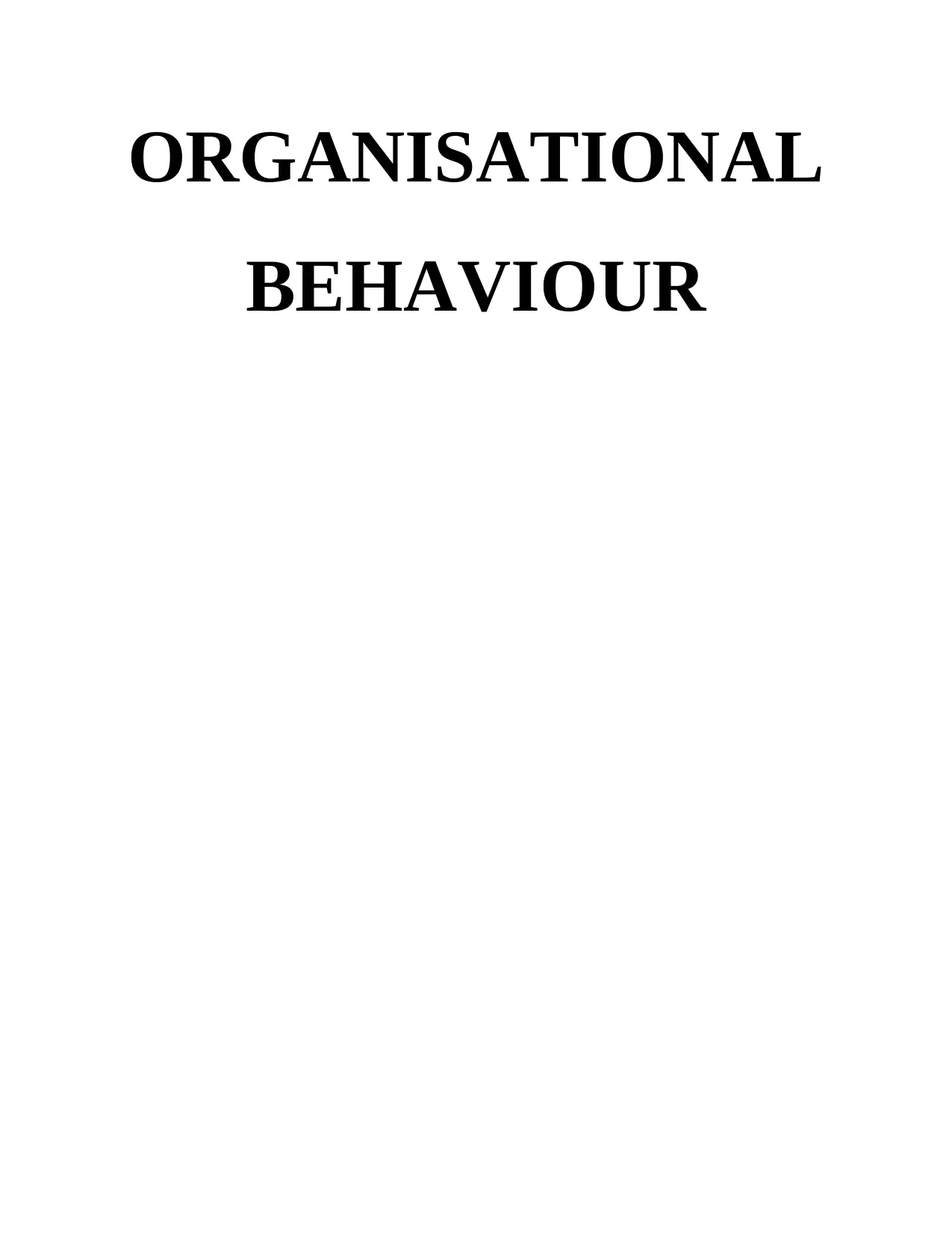
ORGANISATIONAL
BEHAVIOUR
BEHAVIOUR
Paraphrase This Document
Need a fresh take? Get an instant paraphrase of this document with our AI Paraphraser
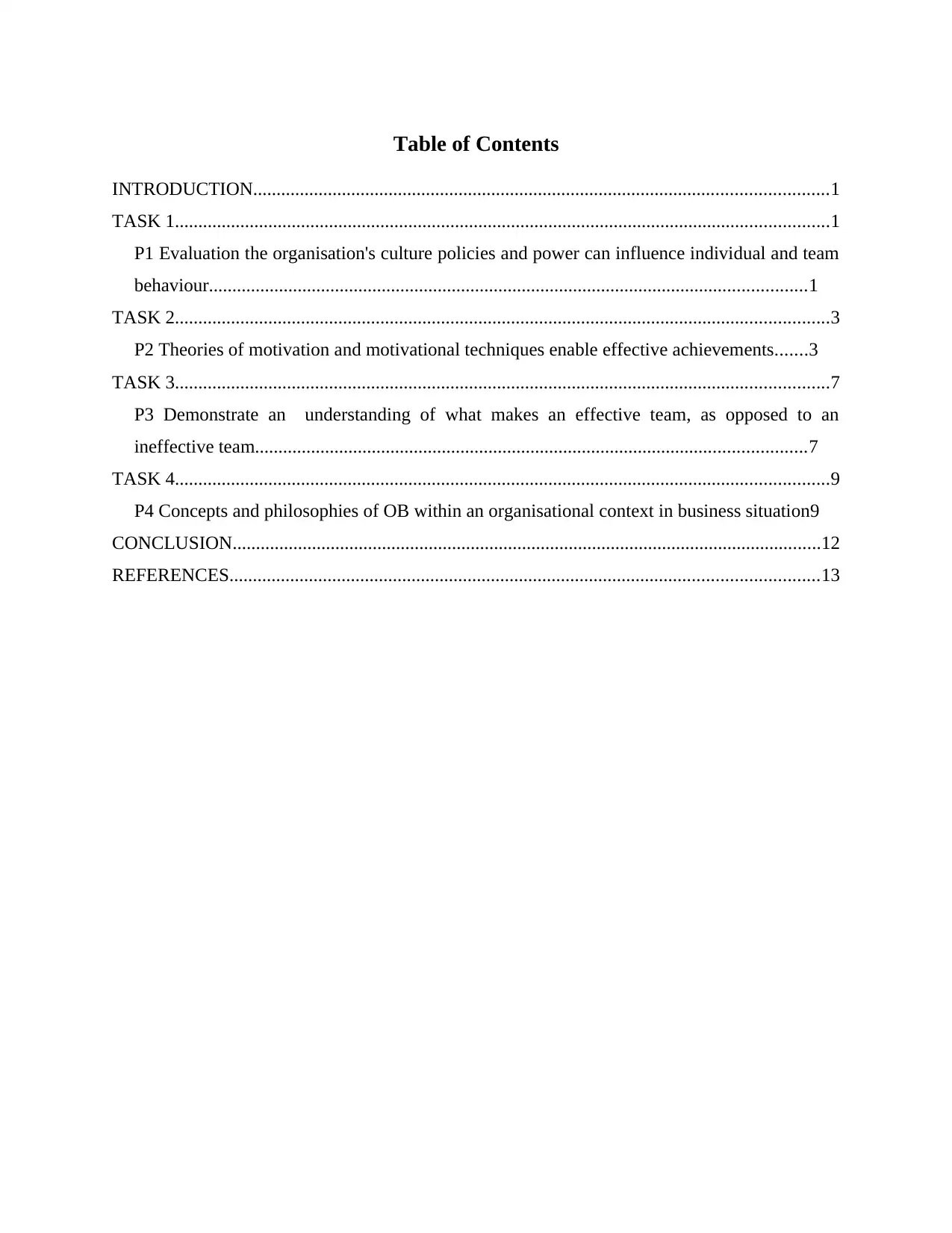
Table of Contents
INTRODUCTION...........................................................................................................................1
TASK 1............................................................................................................................................1
P1 Evaluation the organisation's culture policies and power can influence individual and team
behaviour................................................................................................................................1
TASK 2............................................................................................................................................3
P2 Theories of motivation and motivational techniques enable effective achievements.......3
TASK 3............................................................................................................................................7
P3 Demonstrate an understanding of what makes an effective team, as opposed to an
ineffective team......................................................................................................................7
TASK 4............................................................................................................................................9
P4 Concepts and philosophies of OB within an organisational context in business situation9
CONCLUSION..............................................................................................................................12
REFERENCES..............................................................................................................................13
INTRODUCTION...........................................................................................................................1
TASK 1............................................................................................................................................1
P1 Evaluation the organisation's culture policies and power can influence individual and team
behaviour................................................................................................................................1
TASK 2............................................................................................................................................3
P2 Theories of motivation and motivational techniques enable effective achievements.......3
TASK 3............................................................................................................................................7
P3 Demonstrate an understanding of what makes an effective team, as opposed to an
ineffective team......................................................................................................................7
TASK 4............................................................................................................................................9
P4 Concepts and philosophies of OB within an organisational context in business situation9
CONCLUSION..............................................................................................................................12
REFERENCES..............................................................................................................................13
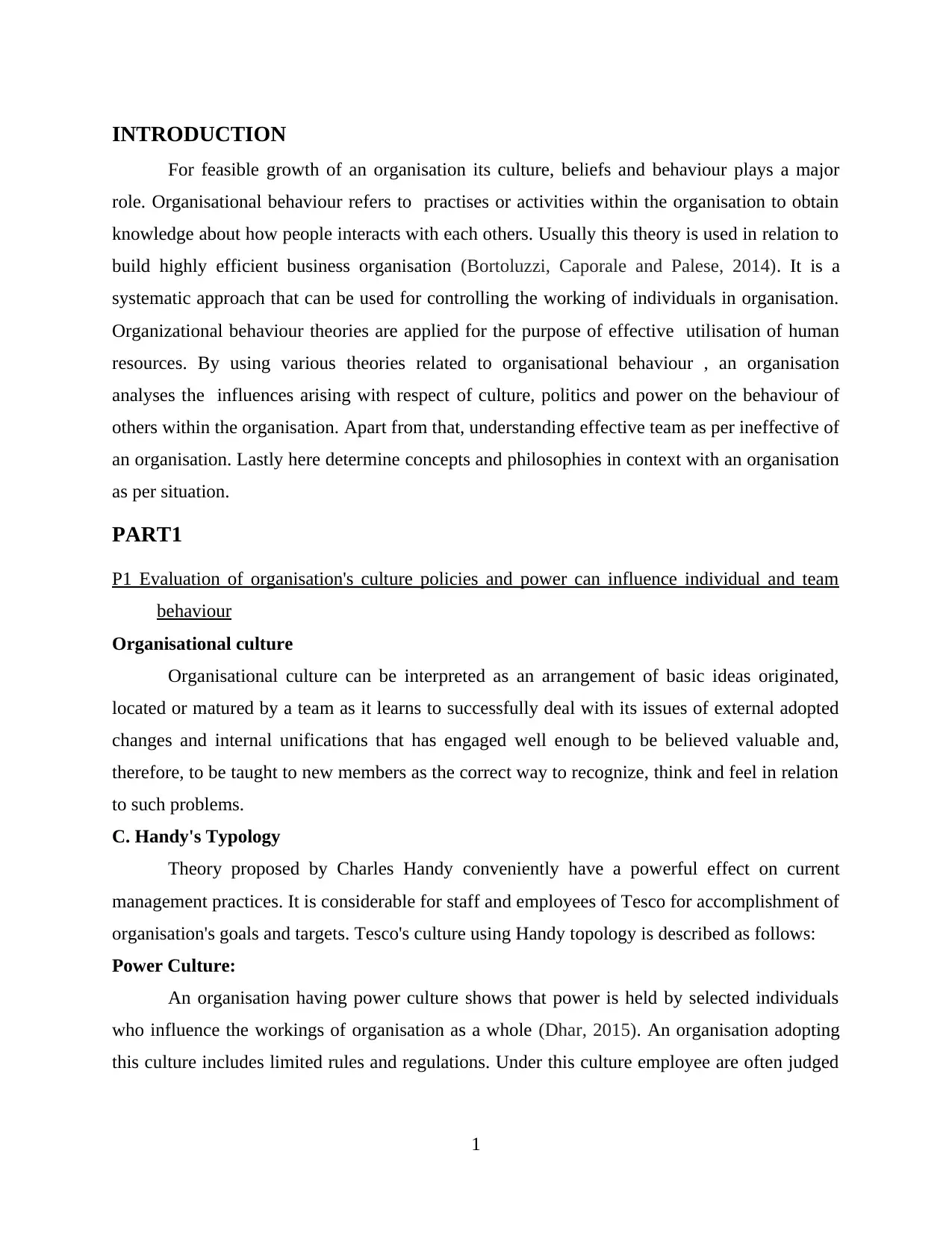
INTRODUCTION
For feasible growth of an organisation its culture, beliefs and behaviour plays a major
role. Organisational behaviour refers to practises or activities within the organisation to obtain
knowledge about how people interacts with each others. Usually this theory is used in relation to
build highly efficient business organisation (Bortoluzzi, Caporale and Palese, 2014). It is a
systematic approach that can be used for controlling the working of individuals in organisation.
Organizational behaviour theories are applied for the purpose of effective utilisation of human
resources. By using various theories related to organisational behaviour , an organisation
analyses the influences arising with respect of culture, politics and power on the behaviour of
others within the organisation. Apart from that, understanding effective team as per ineffective of
an organisation. Lastly here determine concepts and philosophies in context with an organisation
as per situation.
PART1
P1 Evaluation of organisation's culture policies and power can influence individual and team
behaviour
Organisational culture
Organisational culture can be interpreted as an arrangement of basic ideas originated,
located or matured by a team as it learns to successfully deal with its issues of external adopted
changes and internal unifications that has engaged well enough to be believed valuable and,
therefore, to be taught to new members as the correct way to recognize, think and feel in relation
to such problems.
C. Handy's Typology
Theory proposed by Charles Handy conveniently have a powerful effect on current
management practices. It is considerable for staff and employees of Tesco for accomplishment of
organisation's goals and targets. Tesco's culture using Handy topology is described as follows:
Power Culture:
An organisation having power culture shows that power is held by selected individuals
who influence the workings of organisation as a whole (Dhar, 2015). An organisation adopting
this culture includes limited rules and regulations. Under this culture employee are often judged
1
For feasible growth of an organisation its culture, beliefs and behaviour plays a major
role. Organisational behaviour refers to practises or activities within the organisation to obtain
knowledge about how people interacts with each others. Usually this theory is used in relation to
build highly efficient business organisation (Bortoluzzi, Caporale and Palese, 2014). It is a
systematic approach that can be used for controlling the working of individuals in organisation.
Organizational behaviour theories are applied for the purpose of effective utilisation of human
resources. By using various theories related to organisational behaviour , an organisation
analyses the influences arising with respect of culture, politics and power on the behaviour of
others within the organisation. Apart from that, understanding effective team as per ineffective of
an organisation. Lastly here determine concepts and philosophies in context with an organisation
as per situation.
PART1
P1 Evaluation of organisation's culture policies and power can influence individual and team
behaviour
Organisational culture
Organisational culture can be interpreted as an arrangement of basic ideas originated,
located or matured by a team as it learns to successfully deal with its issues of external adopted
changes and internal unifications that has engaged well enough to be believed valuable and,
therefore, to be taught to new members as the correct way to recognize, think and feel in relation
to such problems.
C. Handy's Typology
Theory proposed by Charles Handy conveniently have a powerful effect on current
management practices. It is considerable for staff and employees of Tesco for accomplishment of
organisation's goals and targets. Tesco's culture using Handy topology is described as follows:
Power Culture:
An organisation having power culture shows that power is held by selected individuals
who influence the workings of organisation as a whole (Dhar, 2015). An organisation adopting
this culture includes limited rules and regulations. Under this culture employee are often judged
1
⊘ This is a preview!⊘
Do you want full access?
Subscribe today to unlock all pages.

Trusted by 1+ million students worldwide
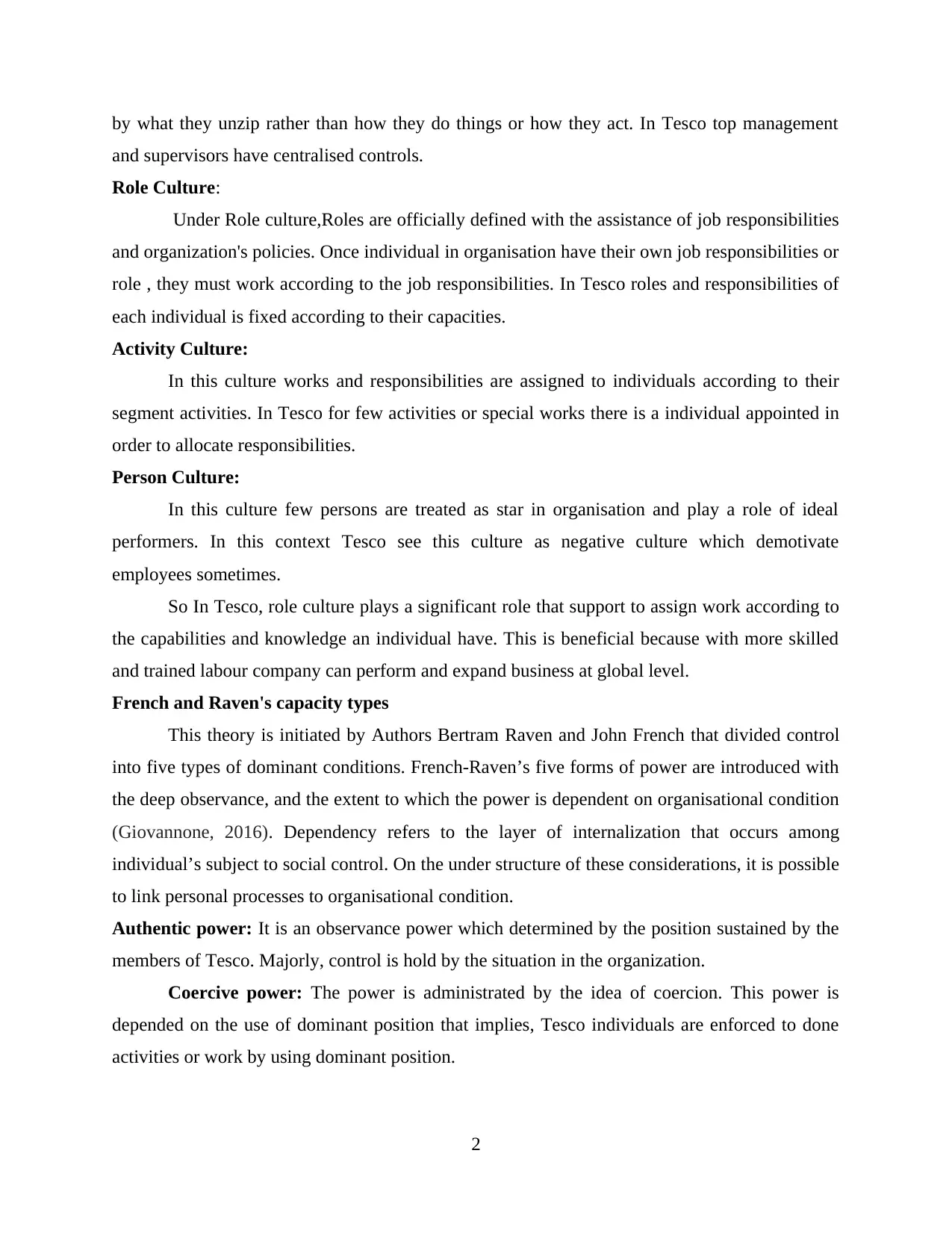
by what they unzip rather than how they do things or how they act. In Tesco top management
and supervisors have centralised controls.
Role Culture:
Under Role culture,Roles are officially defined with the assistance of job responsibilities
and organization's policies. Once individual in organisation have their own job responsibilities or
role , they must work according to the job responsibilities. In Tesco roles and responsibilities of
each individual is fixed according to their capacities.
Activity Culture:
In this culture works and responsibilities are assigned to individuals according to their
segment activities. In Tesco for few activities or special works there is a individual appointed in
order to allocate responsibilities.
Person Culture:
In this culture few persons are treated as star in organisation and play a role of ideal
performers. In this context Tesco see this culture as negative culture which demotivate
employees sometimes.
So In Tesco, role culture plays a significant role that support to assign work according to
the capabilities and knowledge an individual have. This is beneficial because with more skilled
and trained labour company can perform and expand business at global level.
French and Raven's capacity types
This theory is initiated by Authors Bertram Raven and John French that divided control
into five types of dominant conditions. French-Raven’s five forms of power are introduced with
the deep observance, and the extent to which the power is dependent on organisational condition
(Giovannone, 2016). Dependency refers to the layer of internalization that occurs among
individual’s subject to social control. On the under structure of these considerations, it is possible
to link personal processes to organisational condition.
Authentic power: It is an observance power which determined by the position sustained by the
members of Tesco. Majorly, control is hold by the situation in the organization.
Coercive power: The power is administrated by the idea of coercion. This power is
depended on the use of dominant position that implies, Tesco individuals are enforced to done
activities or work by using dominant position.
2
and supervisors have centralised controls.
Role Culture:
Under Role culture,Roles are officially defined with the assistance of job responsibilities
and organization's policies. Once individual in organisation have their own job responsibilities or
role , they must work according to the job responsibilities. In Tesco roles and responsibilities of
each individual is fixed according to their capacities.
Activity Culture:
In this culture works and responsibilities are assigned to individuals according to their
segment activities. In Tesco for few activities or special works there is a individual appointed in
order to allocate responsibilities.
Person Culture:
In this culture few persons are treated as star in organisation and play a role of ideal
performers. In this context Tesco see this culture as negative culture which demotivate
employees sometimes.
So In Tesco, role culture plays a significant role that support to assign work according to
the capabilities and knowledge an individual have. This is beneficial because with more skilled
and trained labour company can perform and expand business at global level.
French and Raven's capacity types
This theory is initiated by Authors Bertram Raven and John French that divided control
into five types of dominant conditions. French-Raven’s five forms of power are introduced with
the deep observance, and the extent to which the power is dependent on organisational condition
(Giovannone, 2016). Dependency refers to the layer of internalization that occurs among
individual’s subject to social control. On the under structure of these considerations, it is possible
to link personal processes to organisational condition.
Authentic power: It is an observance power which determined by the position sustained by the
members of Tesco. Majorly, control is hold by the situation in the organization.
Coercive power: The power is administrated by the idea of coercion. This power is
depended on the use of dominant position that implies, Tesco individuals are enforced to done
activities or work by using dominant position.
2
Paraphrase This Document
Need a fresh take? Get an instant paraphrase of this document with our AI Paraphraser
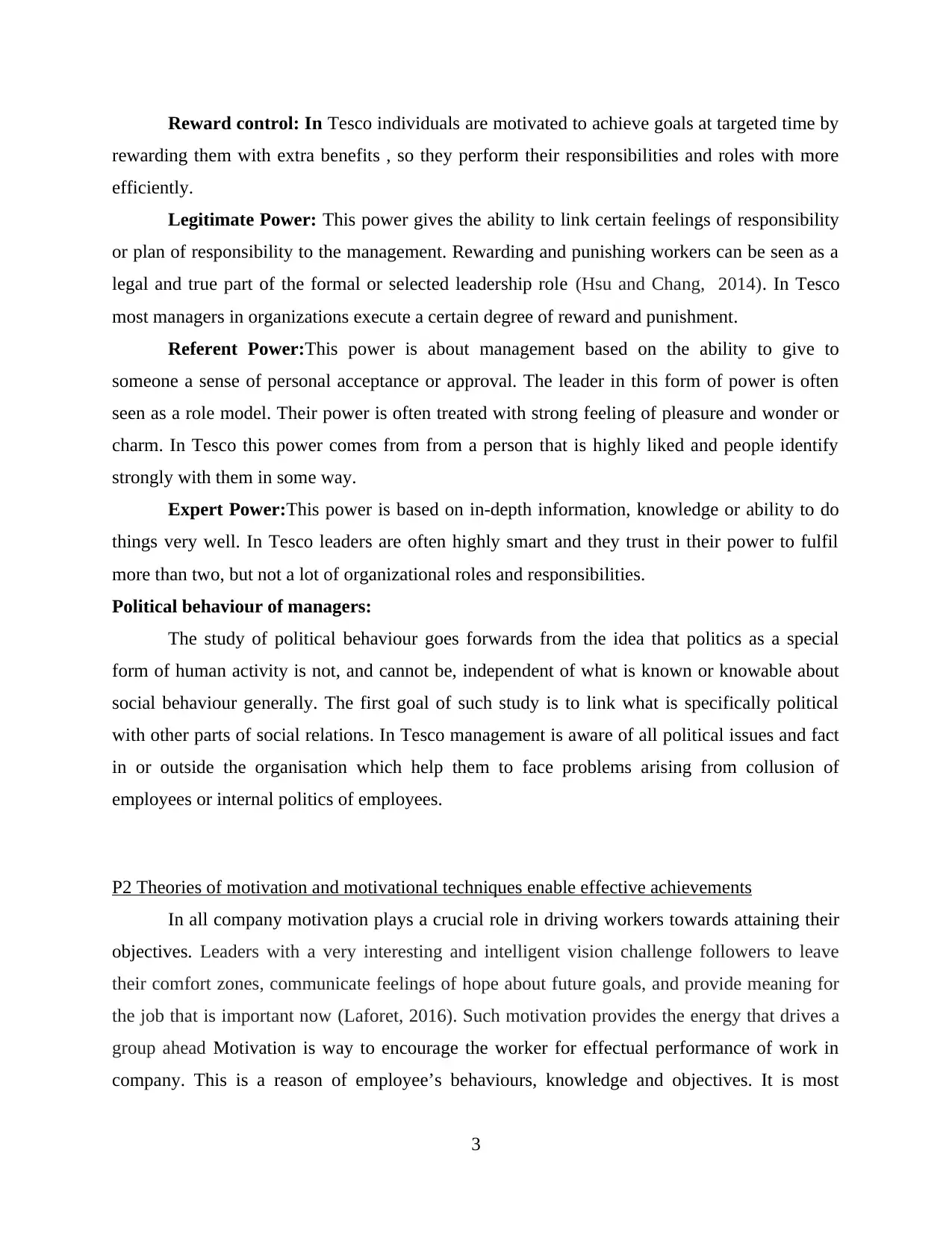
Reward control: In Tesco individuals are motivated to achieve goals at targeted time by
rewarding them with extra benefits , so they perform their responsibilities and roles with more
efficiently.
Legitimate Power: This power gives the ability to link certain feelings of responsibility
or plan of responsibility to the management. Rewarding and punishing workers can be seen as a
legal and true part of the formal or selected leadership role (Hsu and Chang, 2014). In Tesco
most managers in organizations execute a certain degree of reward and punishment.
Referent Power:This power is about management based on the ability to give to
someone a sense of personal acceptance or approval. The leader in this form of power is often
seen as a role model. Their power is often treated with strong feeling of pleasure and wonder or
charm. In Tesco this power comes from from a person that is highly liked and people identify
strongly with them in some way.
Expert Power:This power is based on in-depth information, knowledge or ability to do
things very well. In Tesco leaders are often highly smart and they trust in their power to fulfil
more than two, but not a lot of organizational roles and responsibilities.
Political behaviour of managers:
The study of political behaviour goes forwards from the idea that politics as a special
form of human activity is not, and cannot be, independent of what is known or knowable about
social behaviour generally. The first goal of such study is to link what is specifically political
with other parts of social relations. In Tesco management is aware of all political issues and fact
in or outside the organisation which help them to face problems arising from collusion of
employees or internal politics of employees.
P2 Theories of motivation and motivational techniques enable effective achievements
In all company motivation plays a crucial role in driving workers towards attaining their
objectives. Leaders with a very interesting and intelligent vision challenge followers to leave
their comfort zones, communicate feelings of hope about future goals, and provide meaning for
the job that is important now (Laforet, 2016). Such motivation provides the energy that drives a
group ahead Motivation is way to encourage the worker for effectual performance of work in
company. This is a reason of employee’s behaviours, knowledge and objectives. It is most
3
rewarding them with extra benefits , so they perform their responsibilities and roles with more
efficiently.
Legitimate Power: This power gives the ability to link certain feelings of responsibility
or plan of responsibility to the management. Rewarding and punishing workers can be seen as a
legal and true part of the formal or selected leadership role (Hsu and Chang, 2014). In Tesco
most managers in organizations execute a certain degree of reward and punishment.
Referent Power:This power is about management based on the ability to give to
someone a sense of personal acceptance or approval. The leader in this form of power is often
seen as a role model. Their power is often treated with strong feeling of pleasure and wonder or
charm. In Tesco this power comes from from a person that is highly liked and people identify
strongly with them in some way.
Expert Power:This power is based on in-depth information, knowledge or ability to do
things very well. In Tesco leaders are often highly smart and they trust in their power to fulfil
more than two, but not a lot of organizational roles and responsibilities.
Political behaviour of managers:
The study of political behaviour goes forwards from the idea that politics as a special
form of human activity is not, and cannot be, independent of what is known or knowable about
social behaviour generally. The first goal of such study is to link what is specifically political
with other parts of social relations. In Tesco management is aware of all political issues and fact
in or outside the organisation which help them to face problems arising from collusion of
employees or internal politics of employees.
P2 Theories of motivation and motivational techniques enable effective achievements
In all company motivation plays a crucial role in driving workers towards attaining their
objectives. Leaders with a very interesting and intelligent vision challenge followers to leave
their comfort zones, communicate feelings of hope about future goals, and provide meaning for
the job that is important now (Laforet, 2016). Such motivation provides the energy that drives a
group ahead Motivation is way to encourage the worker for effectual performance of work in
company. This is a reason of employee’s behaviours, knowledge and objectives. It is most
3
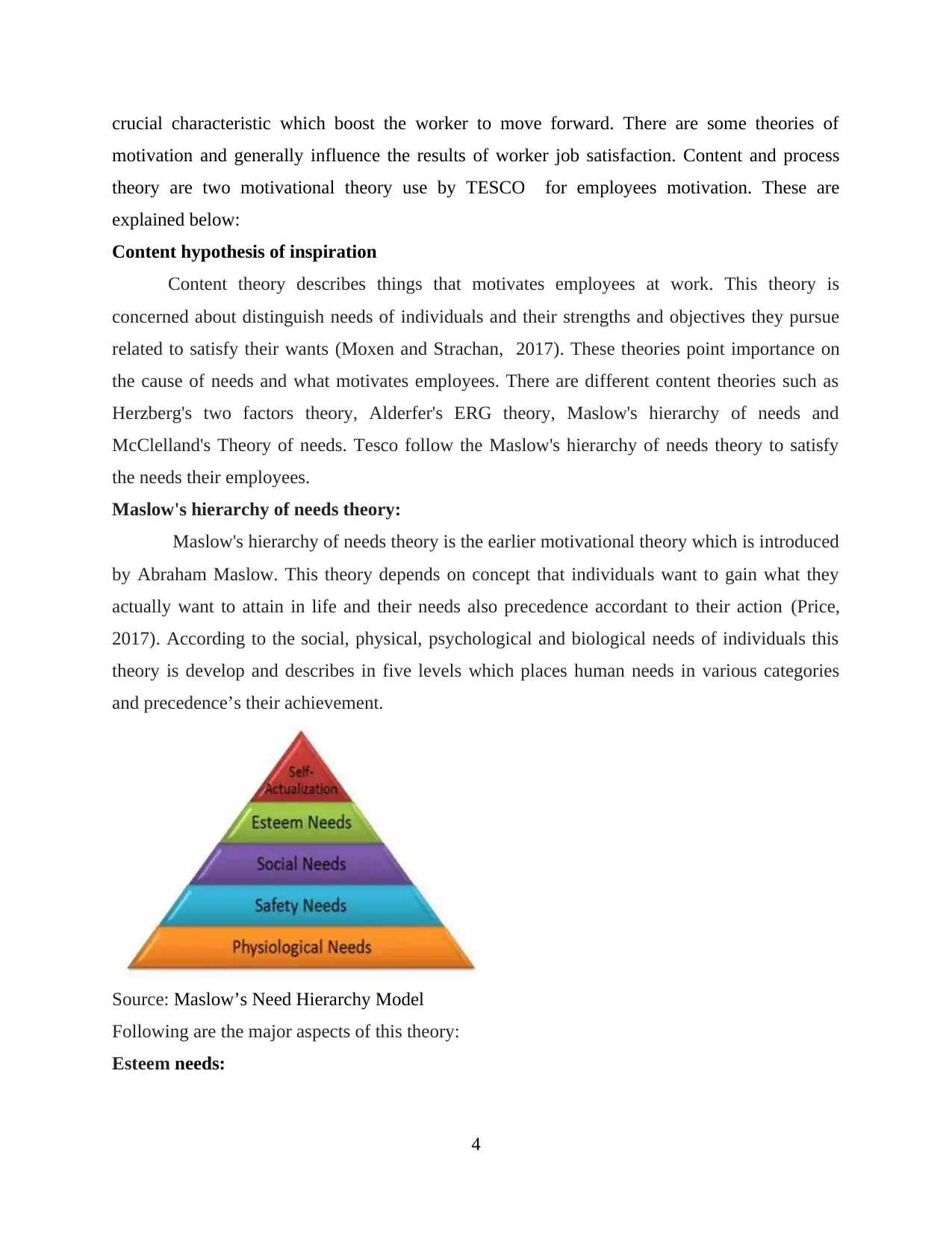
crucial characteristic which boost the worker to move forward. There are some theories of
motivation and generally influence the results of worker job satisfaction. Content and process
theory are two motivational theory use by TESCO for employees motivation. These are
explained below:
Content hypothesis of inspiration
Content theory describes things that motivates employees at work. This theory is
concerned about distinguish needs of individuals and their strengths and objectives they pursue
related to satisfy their wants (Moxen and Strachan, 2017). These theories point importance on
the cause of needs and what motivates employees. There are different content theories such as
Herzberg's two factors theory, Alderfer's ERG theory, Maslow's hierarchy of needs and
McClelland's Theory of needs. Tesco follow the Maslow's hierarchy of needs theory to satisfy
the needs their employees.
Maslow's hierarchy of needs theory:
Maslow's hierarchy of needs theory is the earlier motivational theory which is introduced
by Abraham Maslow. This theory depends on concept that individuals want to gain what they
actually want to attain in life and their needs also precedence accordant to their action (Price,
2017). According to the social, physical, psychological and biological needs of individuals this
theory is develop and describes in five levels which places human needs in various categories
and precedence’s their achievement.
Source: Maslow’s Need Hierarchy Model
Following are the major aspects of this theory:
Esteem needs:
4
motivation and generally influence the results of worker job satisfaction. Content and process
theory are two motivational theory use by TESCO for employees motivation. These are
explained below:
Content hypothesis of inspiration
Content theory describes things that motivates employees at work. This theory is
concerned about distinguish needs of individuals and their strengths and objectives they pursue
related to satisfy their wants (Moxen and Strachan, 2017). These theories point importance on
the cause of needs and what motivates employees. There are different content theories such as
Herzberg's two factors theory, Alderfer's ERG theory, Maslow's hierarchy of needs and
McClelland's Theory of needs. Tesco follow the Maslow's hierarchy of needs theory to satisfy
the needs their employees.
Maslow's hierarchy of needs theory:
Maslow's hierarchy of needs theory is the earlier motivational theory which is introduced
by Abraham Maslow. This theory depends on concept that individuals want to gain what they
actually want to attain in life and their needs also precedence accordant to their action (Price,
2017). According to the social, physical, psychological and biological needs of individuals this
theory is develop and describes in five levels which places human needs in various categories
and precedence’s their achievement.
Source: Maslow’s Need Hierarchy Model
Following are the major aspects of this theory:
Esteem needs:
4
⊘ This is a preview!⊘
Do you want full access?
Subscribe today to unlock all pages.

Trusted by 1+ million students worldwide
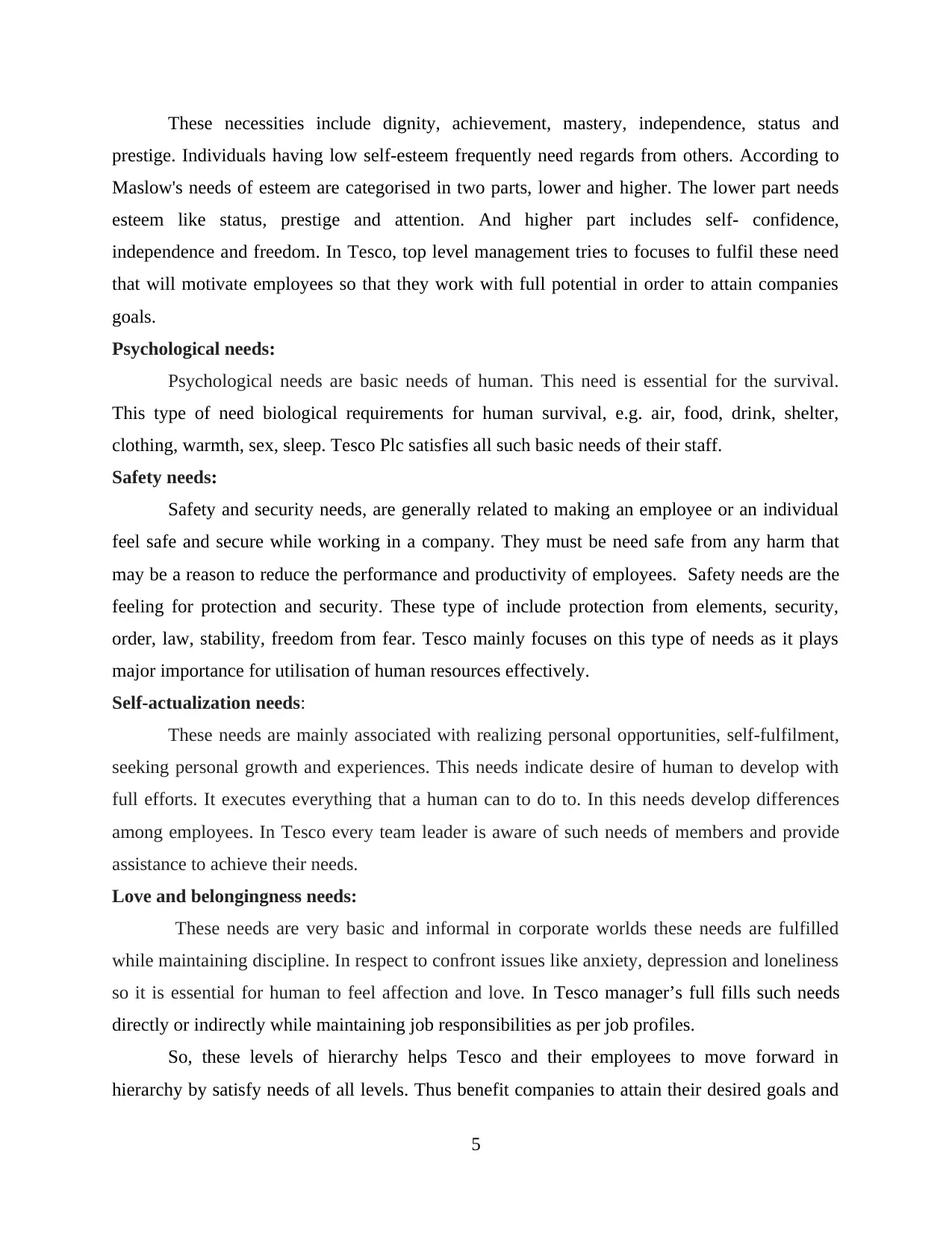
These necessities include dignity, achievement, mastery, independence, status and
prestige. Individuals having low self-esteem frequently need regards from others. According to
Maslow's needs of esteem are categorised in two parts, lower and higher. The lower part needs
esteem like status, prestige and attention. And higher part includes self- confidence,
independence and freedom. In Tesco, top level management tries to focuses to fulfil these need
that will motivate employees so that they work with full potential in order to attain companies
goals.
Psychological needs:
Psychological needs are basic needs of human. This need is essential for the survival.
This type of need biological requirements for human survival, e.g. air, food, drink, shelter,
clothing, warmth, sex, sleep. Tesco Plc satisfies all such basic needs of their staff.
Safety needs:
Safety and security needs, are generally related to making an employee or an individual
feel safe and secure while working in a company. They must be need safe from any harm that
may be a reason to reduce the performance and productivity of employees. Safety needs are the
feeling for protection and security. These type of include protection from elements, security,
order, law, stability, freedom from fear. Tesco mainly focuses on this type of needs as it plays
major importance for utilisation of human resources effectively.
Self-actualization needs:
These needs are mainly associated with realizing personal opportunities, self-fulfilment,
seeking personal growth and experiences. This needs indicate desire of human to develop with
full efforts. It executes everything that a human can to do to. In this needs develop differences
among employees. In Tesco every team leader is aware of such needs of members and provide
assistance to achieve their needs.
Love and belongingness needs:
These needs are very basic and informal in corporate worlds these needs are fulfilled
while maintaining discipline. In respect to confront issues like anxiety, depression and loneliness
so it is essential for human to feel affection and love. In Tesco manager’s full fills such needs
directly or indirectly while maintaining job responsibilities as per job profiles.
So, these levels of hierarchy helps Tesco and their employees to move forward in
hierarchy by satisfy needs of all levels. Thus benefit companies to attain their desired goals and
5
prestige. Individuals having low self-esteem frequently need regards from others. According to
Maslow's needs of esteem are categorised in two parts, lower and higher. The lower part needs
esteem like status, prestige and attention. And higher part includes self- confidence,
independence and freedom. In Tesco, top level management tries to focuses to fulfil these need
that will motivate employees so that they work with full potential in order to attain companies
goals.
Psychological needs:
Psychological needs are basic needs of human. This need is essential for the survival.
This type of need biological requirements for human survival, e.g. air, food, drink, shelter,
clothing, warmth, sex, sleep. Tesco Plc satisfies all such basic needs of their staff.
Safety needs:
Safety and security needs, are generally related to making an employee or an individual
feel safe and secure while working in a company. They must be need safe from any harm that
may be a reason to reduce the performance and productivity of employees. Safety needs are the
feeling for protection and security. These type of include protection from elements, security,
order, law, stability, freedom from fear. Tesco mainly focuses on this type of needs as it plays
major importance for utilisation of human resources effectively.
Self-actualization needs:
These needs are mainly associated with realizing personal opportunities, self-fulfilment,
seeking personal growth and experiences. This needs indicate desire of human to develop with
full efforts. It executes everything that a human can to do to. In this needs develop differences
among employees. In Tesco every team leader is aware of such needs of members and provide
assistance to achieve their needs.
Love and belongingness needs:
These needs are very basic and informal in corporate worlds these needs are fulfilled
while maintaining discipline. In respect to confront issues like anxiety, depression and loneliness
so it is essential for human to feel affection and love. In Tesco manager’s full fills such needs
directly or indirectly while maintaining job responsibilities as per job profiles.
So, these levels of hierarchy helps Tesco and their employees to move forward in
hierarchy by satisfy needs of all levels. Thus benefit companies to attain their desired goals and
5
Paraphrase This Document
Need a fresh take? Get an instant paraphrase of this document with our AI Paraphraser
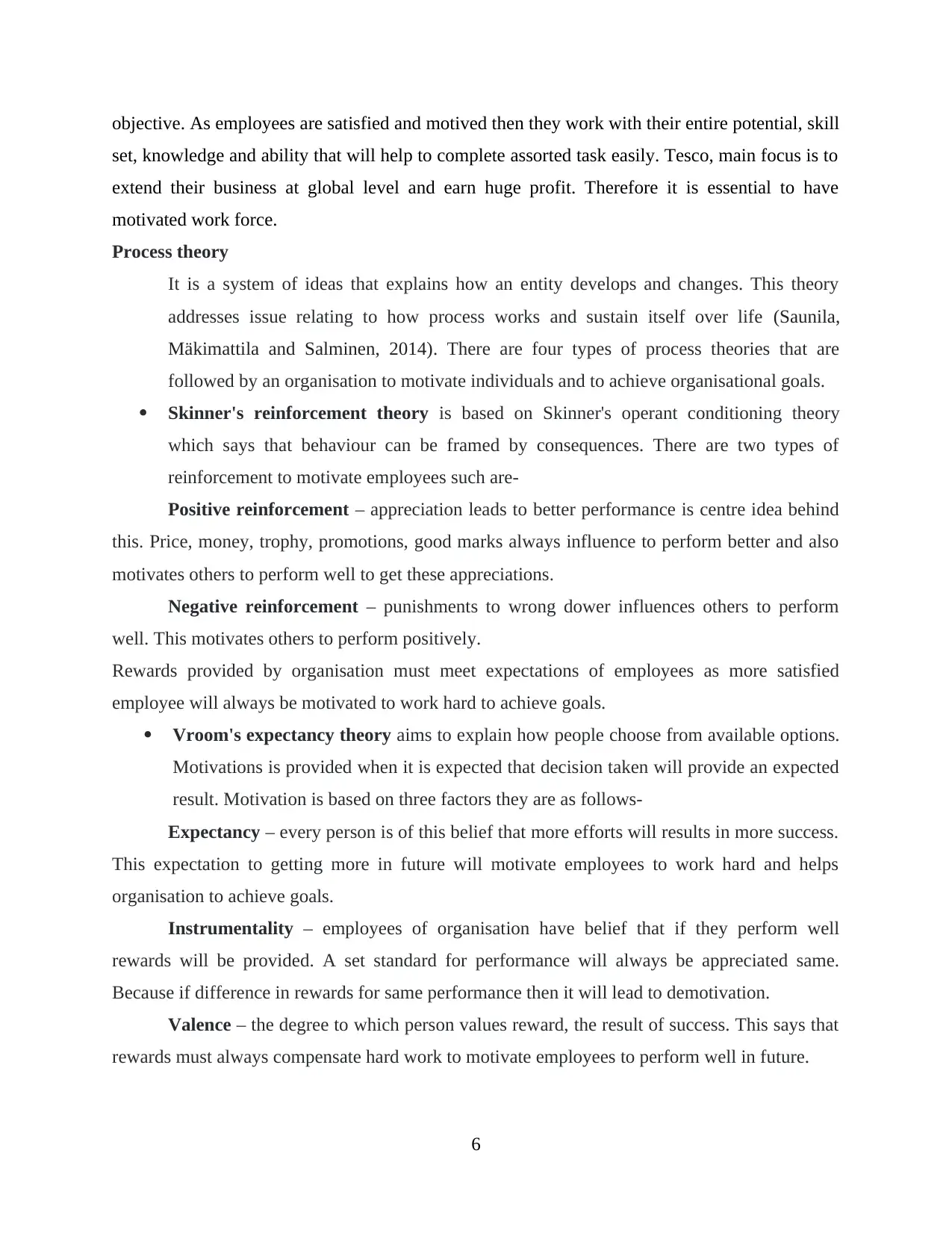
objective. As employees are satisfied and motived then they work with their entire potential, skill
set, knowledge and ability that will help to complete assorted task easily. Tesco, main focus is to
extend their business at global level and earn huge profit. Therefore it is essential to have
motivated work force.
Process theory
It is a system of ideas that explains how an entity develops and changes. This theory
addresses issue relating to how process works and sustain itself over life (Saunila,
Mäkimattila and Salminen, 2014). There are four types of process theories that are
followed by an organisation to motivate individuals and to achieve organisational goals.
Skinner's reinforcement theory is based on Skinner's operant conditioning theory
which says that behaviour can be framed by consequences. There are two types of
reinforcement to motivate employees such are-
Positive reinforcement – appreciation leads to better performance is centre idea behind
this. Price, money, trophy, promotions, good marks always influence to perform better and also
motivates others to perform well to get these appreciations.
Negative reinforcement – punishments to wrong dower influences others to perform
well. This motivates others to perform positively.
Rewards provided by organisation must meet expectations of employees as more satisfied
employee will always be motivated to work hard to achieve goals.
Vroom's expectancy theory aims to explain how people choose from available options.
Motivations is provided when it is expected that decision taken will provide an expected
result. Motivation is based on three factors they are as follows-
Expectancy – every person is of this belief that more efforts will results in more success.
This expectation to getting more in future will motivate employees to work hard and helps
organisation to achieve goals.
Instrumentality – employees of organisation have belief that if they perform well
rewards will be provided. A set standard for performance will always be appreciated same.
Because if difference in rewards for same performance then it will lead to demotivation.
Valence – the degree to which person values reward, the result of success. This says that
rewards must always compensate hard work to motivate employees to perform well in future.
6
set, knowledge and ability that will help to complete assorted task easily. Tesco, main focus is to
extend their business at global level and earn huge profit. Therefore it is essential to have
motivated work force.
Process theory
It is a system of ideas that explains how an entity develops and changes. This theory
addresses issue relating to how process works and sustain itself over life (Saunila,
Mäkimattila and Salminen, 2014). There are four types of process theories that are
followed by an organisation to motivate individuals and to achieve organisational goals.
Skinner's reinforcement theory is based on Skinner's operant conditioning theory
which says that behaviour can be framed by consequences. There are two types of
reinforcement to motivate employees such are-
Positive reinforcement – appreciation leads to better performance is centre idea behind
this. Price, money, trophy, promotions, good marks always influence to perform better and also
motivates others to perform well to get these appreciations.
Negative reinforcement – punishments to wrong dower influences others to perform
well. This motivates others to perform positively.
Rewards provided by organisation must meet expectations of employees as more satisfied
employee will always be motivated to work hard to achieve goals.
Vroom's expectancy theory aims to explain how people choose from available options.
Motivations is provided when it is expected that decision taken will provide an expected
result. Motivation is based on three factors they are as follows-
Expectancy – every person is of this belief that more efforts will results in more success.
This expectation to getting more in future will motivate employees to work hard and helps
organisation to achieve goals.
Instrumentality – employees of organisation have belief that if they perform well
rewards will be provided. A set standard for performance will always be appreciated same.
Because if difference in rewards for same performance then it will lead to demotivation.
Valence – the degree to which person values reward, the result of success. This says that
rewards must always compensate hard work to motivate employees to perform well in future.
6
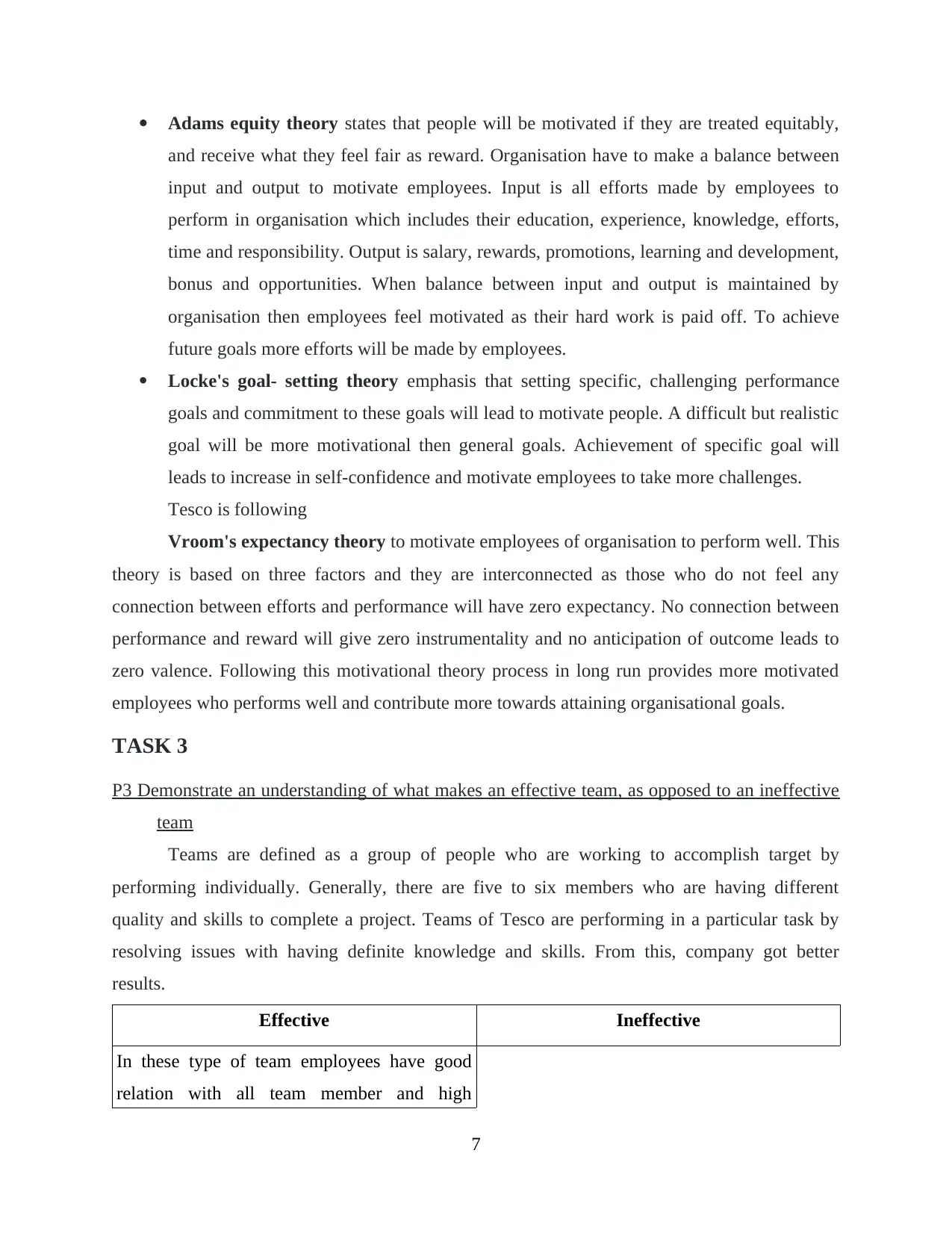
Adams equity theory states that people will be motivated if they are treated equitably,
and receive what they feel fair as reward. Organisation have to make a balance between
input and output to motivate employees. Input is all efforts made by employees to
perform in organisation which includes their education, experience, knowledge, efforts,
time and responsibility. Output is salary, rewards, promotions, learning and development,
bonus and opportunities. When balance between input and output is maintained by
organisation then employees feel motivated as their hard work is paid off. To achieve
future goals more efforts will be made by employees.
Locke's goal- setting theory emphasis that setting specific, challenging performance
goals and commitment to these goals will lead to motivate people. A difficult but realistic
goal will be more motivational then general goals. Achievement of specific goal will
leads to increase in self-confidence and motivate employees to take more challenges.
Tesco is following
Vroom's expectancy theory to motivate employees of organisation to perform well. This
theory is based on three factors and they are interconnected as those who do not feel any
connection between efforts and performance will have zero expectancy. No connection between
performance and reward will give zero instrumentality and no anticipation of outcome leads to
zero valence. Following this motivational theory process in long run provides more motivated
employees who performs well and contribute more towards attaining organisational goals.
TASK 3
P3 Demonstrate an understanding of what makes an effective team, as opposed to an ineffective
team
Teams are defined as a group of people who are working to accomplish target by
performing individually. Generally, there are five to six members who are having different
quality and skills to complete a project. Teams of Tesco are performing in a particular task by
resolving issues with having definite knowledge and skills. From this, company got better
results.
Effective Ineffective
In these type of team employees have good
relation with all team member and high
7
and receive what they feel fair as reward. Organisation have to make a balance between
input and output to motivate employees. Input is all efforts made by employees to
perform in organisation which includes their education, experience, knowledge, efforts,
time and responsibility. Output is salary, rewards, promotions, learning and development,
bonus and opportunities. When balance between input and output is maintained by
organisation then employees feel motivated as their hard work is paid off. To achieve
future goals more efforts will be made by employees.
Locke's goal- setting theory emphasis that setting specific, challenging performance
goals and commitment to these goals will lead to motivate people. A difficult but realistic
goal will be more motivational then general goals. Achievement of specific goal will
leads to increase in self-confidence and motivate employees to take more challenges.
Tesco is following
Vroom's expectancy theory to motivate employees of organisation to perform well. This
theory is based on three factors and they are interconnected as those who do not feel any
connection between efforts and performance will have zero expectancy. No connection between
performance and reward will give zero instrumentality and no anticipation of outcome leads to
zero valence. Following this motivational theory process in long run provides more motivated
employees who performs well and contribute more towards attaining organisational goals.
TASK 3
P3 Demonstrate an understanding of what makes an effective team, as opposed to an ineffective
team
Teams are defined as a group of people who are working to accomplish target by
performing individually. Generally, there are five to six members who are having different
quality and skills to complete a project. Teams of Tesco are performing in a particular task by
resolving issues with having definite knowledge and skills. From this, company got better
results.
Effective Ineffective
In these type of team employees have good
relation with all team member and high
7
⊘ This is a preview!⊘
Do you want full access?
Subscribe today to unlock all pages.

Trusted by 1+ million students worldwide
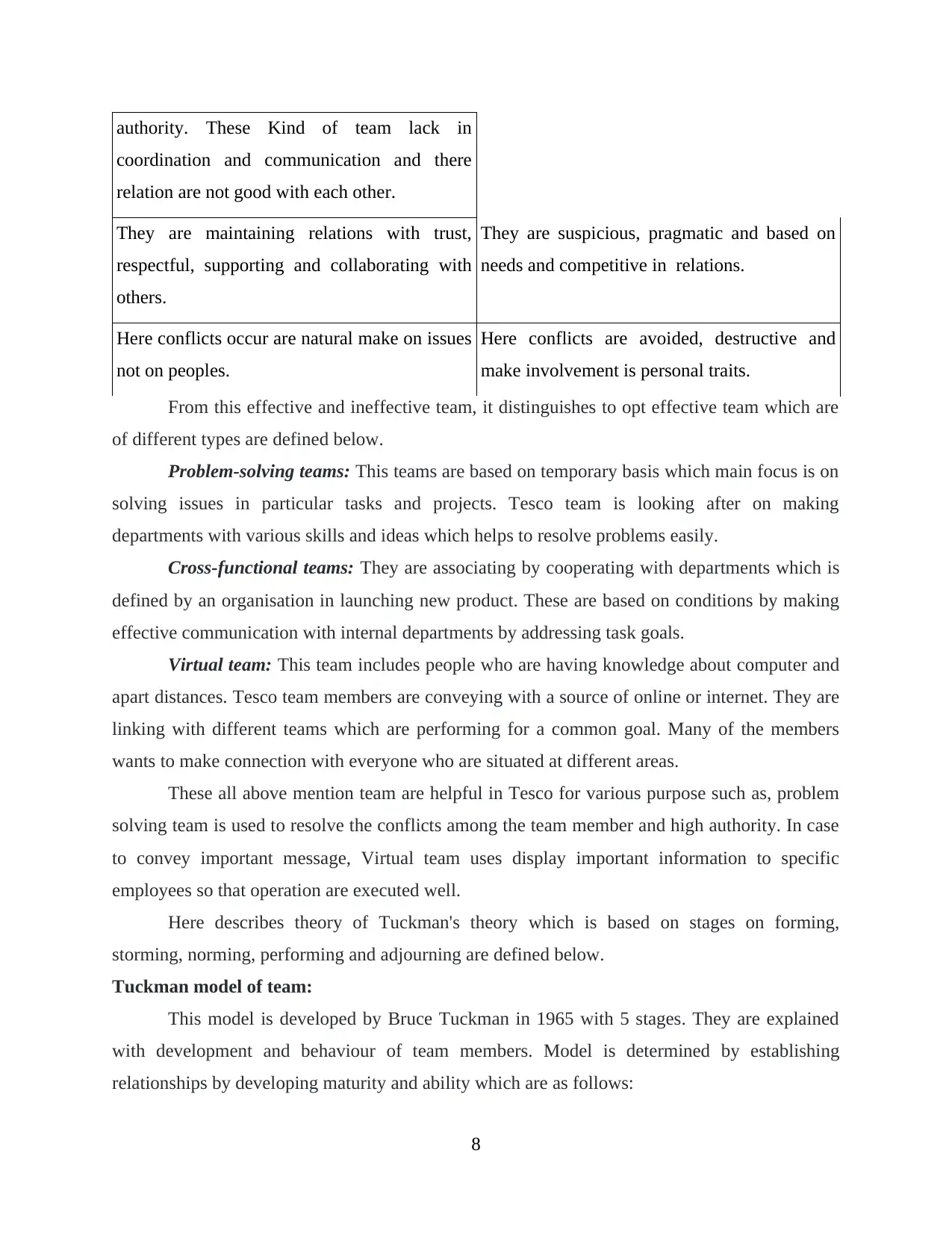
authority. These Kind of team lack in
coordination and communication and there
relation are not good with each other.
They are maintaining relations with trust,
respectful, supporting and collaborating with
others.
They are suspicious, pragmatic and based on
needs and competitive in relations.
Here conflicts occur are natural make on issues
not on peoples.
Here conflicts are avoided, destructive and
make involvement is personal traits.
From this effective and ineffective team, it distinguishes to opt effective team which are
of different types are defined below.
Problem-solving teams: This teams are based on temporary basis which main focus is on
solving issues in particular tasks and projects. Tesco team is looking after on making
departments with various skills and ideas which helps to resolve problems easily.
Cross-functional teams: They are associating by cooperating with departments which is
defined by an organisation in launching new product. These are based on conditions by making
effective communication with internal departments by addressing task goals.
Virtual team: This team includes people who are having knowledge about computer and
apart distances. Tesco team members are conveying with a source of online or internet. They are
linking with different teams which are performing for a common goal. Many of the members
wants to make connection with everyone who are situated at different areas.
These all above mention team are helpful in Tesco for various purpose such as, problem
solving team is used to resolve the conflicts among the team member and high authority. In case
to convey important message, Virtual team uses display important information to specific
employees so that operation are executed well.
Here describes theory of Tuckman's theory which is based on stages on forming,
storming, norming, performing and adjourning are defined below.
Tuckman model of team:
This model is developed by Bruce Tuckman in 1965 with 5 stages. They are explained
with development and behaviour of team members. Model is determined by establishing
relationships by developing maturity and ability which are as follows:
8
coordination and communication and there
relation are not good with each other.
They are maintaining relations with trust,
respectful, supporting and collaborating with
others.
They are suspicious, pragmatic and based on
needs and competitive in relations.
Here conflicts occur are natural make on issues
not on peoples.
Here conflicts are avoided, destructive and
make involvement is personal traits.
From this effective and ineffective team, it distinguishes to opt effective team which are
of different types are defined below.
Problem-solving teams: This teams are based on temporary basis which main focus is on
solving issues in particular tasks and projects. Tesco team is looking after on making
departments with various skills and ideas which helps to resolve problems easily.
Cross-functional teams: They are associating by cooperating with departments which is
defined by an organisation in launching new product. These are based on conditions by making
effective communication with internal departments by addressing task goals.
Virtual team: This team includes people who are having knowledge about computer and
apart distances. Tesco team members are conveying with a source of online or internet. They are
linking with different teams which are performing for a common goal. Many of the members
wants to make connection with everyone who are situated at different areas.
These all above mention team are helpful in Tesco for various purpose such as, problem
solving team is used to resolve the conflicts among the team member and high authority. In case
to convey important message, Virtual team uses display important information to specific
employees so that operation are executed well.
Here describes theory of Tuckman's theory which is based on stages on forming,
storming, norming, performing and adjourning are defined below.
Tuckman model of team:
This model is developed by Bruce Tuckman in 1965 with 5 stages. They are explained
with development and behaviour of team members. Model is determined by establishing
relationships by developing maturity and ability which are as follows:
8
Paraphrase This Document
Need a fresh take? Get an instant paraphrase of this document with our AI Paraphraser
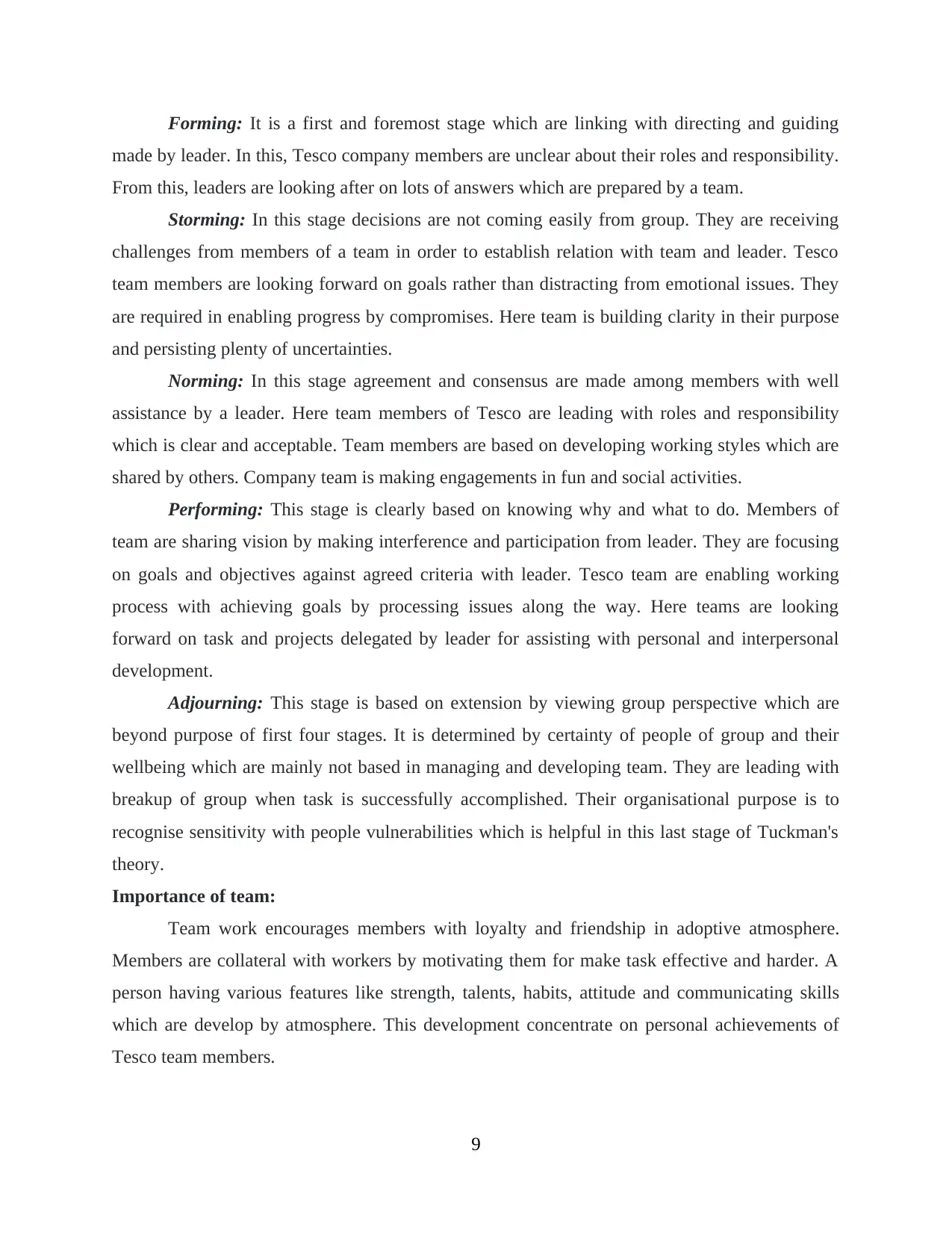
Forming: It is a first and foremost stage which are linking with directing and guiding
made by leader. In this, Tesco company members are unclear about their roles and responsibility.
From this, leaders are looking after on lots of answers which are prepared by a team.
Storming: In this stage decisions are not coming easily from group. They are receiving
challenges from members of a team in order to establish relation with team and leader. Tesco
team members are looking forward on goals rather than distracting from emotional issues. They
are required in enabling progress by compromises. Here team is building clarity in their purpose
and persisting plenty of uncertainties.
Norming: In this stage agreement and consensus are made among members with well
assistance by a leader. Here team members of Tesco are leading with roles and responsibility
which is clear and acceptable. Team members are based on developing working styles which are
shared by others. Company team is making engagements in fun and social activities.
Performing: This stage is clearly based on knowing why and what to do. Members of
team are sharing vision by making interference and participation from leader. They are focusing
on goals and objectives against agreed criteria with leader. Tesco team are enabling working
process with achieving goals by processing issues along the way. Here teams are looking
forward on task and projects delegated by leader for assisting with personal and interpersonal
development.
Adjourning: This stage is based on extension by viewing group perspective which are
beyond purpose of first four stages. It is determined by certainty of people of group and their
wellbeing which are mainly not based in managing and developing team. They are leading with
breakup of group when task is successfully accomplished. Their organisational purpose is to
recognise sensitivity with people vulnerabilities which is helpful in this last stage of Tuckman's
theory.
Importance of team:
Team work encourages members with loyalty and friendship in adoptive atmosphere.
Members are collateral with workers by motivating them for make task effective and harder. A
person having various features like strength, talents, habits, attitude and communicating skills
which are develop by atmosphere. This development concentrate on personal achievements of
Tesco team members.
9
made by leader. In this, Tesco company members are unclear about their roles and responsibility.
From this, leaders are looking after on lots of answers which are prepared by a team.
Storming: In this stage decisions are not coming easily from group. They are receiving
challenges from members of a team in order to establish relation with team and leader. Tesco
team members are looking forward on goals rather than distracting from emotional issues. They
are required in enabling progress by compromises. Here team is building clarity in their purpose
and persisting plenty of uncertainties.
Norming: In this stage agreement and consensus are made among members with well
assistance by a leader. Here team members of Tesco are leading with roles and responsibility
which is clear and acceptable. Team members are based on developing working styles which are
shared by others. Company team is making engagements in fun and social activities.
Performing: This stage is clearly based on knowing why and what to do. Members of
team are sharing vision by making interference and participation from leader. They are focusing
on goals and objectives against agreed criteria with leader. Tesco team are enabling working
process with achieving goals by processing issues along the way. Here teams are looking
forward on task and projects delegated by leader for assisting with personal and interpersonal
development.
Adjourning: This stage is based on extension by viewing group perspective which are
beyond purpose of first four stages. It is determined by certainty of people of group and their
wellbeing which are mainly not based in managing and developing team. They are leading with
breakup of group when task is successfully accomplished. Their organisational purpose is to
recognise sensitivity with people vulnerabilities which is helpful in this last stage of Tuckman's
theory.
Importance of team:
Team work encourages members with loyalty and friendship in adoptive atmosphere.
Members are collateral with workers by motivating them for make task effective and harder. A
person having various features like strength, talents, habits, attitude and communicating skills
which are develop by atmosphere. This development concentrate on personal achievements of
Tesco team members.
9
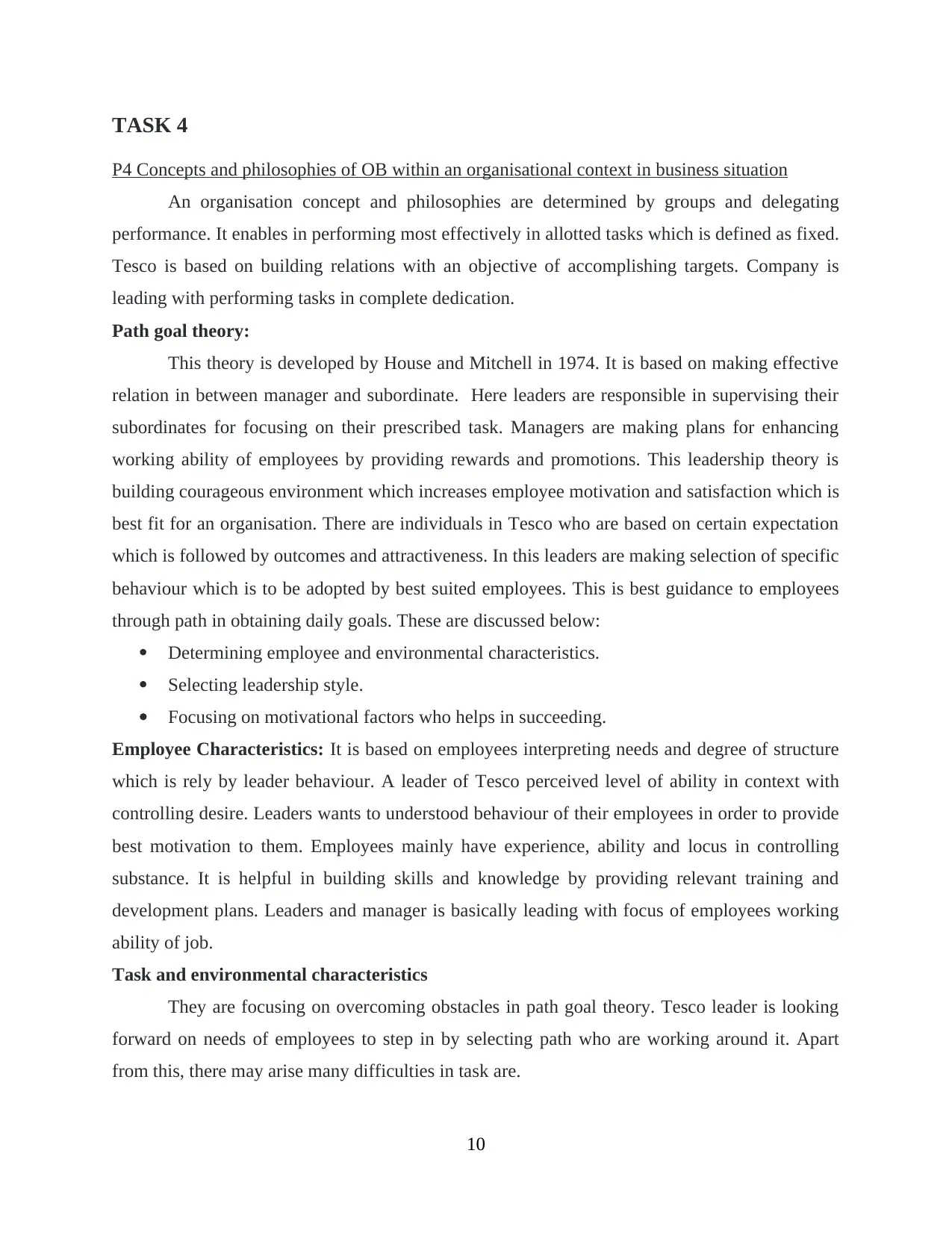
TASK 4
P4 Concepts and philosophies of OB within an organisational context in business situation
An organisation concept and philosophies are determined by groups and delegating
performance. It enables in performing most effectively in allotted tasks which is defined as fixed.
Tesco is based on building relations with an objective of accomplishing targets. Company is
leading with performing tasks in complete dedication.
Path goal theory:
This theory is developed by House and Mitchell in 1974. It is based on making effective
relation in between manager and subordinate. Here leaders are responsible in supervising their
subordinates for focusing on their prescribed task. Managers are making plans for enhancing
working ability of employees by providing rewards and promotions. This leadership theory is
building courageous environment which increases employee motivation and satisfaction which is
best fit for an organisation. There are individuals in Tesco who are based on certain expectation
which is followed by outcomes and attractiveness. In this leaders are making selection of specific
behaviour which is to be adopted by best suited employees. This is best guidance to employees
through path in obtaining daily goals. These are discussed below:
Determining employee and environmental characteristics.
Selecting leadership style.
Focusing on motivational factors who helps in succeeding.
Employee Characteristics: It is based on employees interpreting needs and degree of structure
which is rely by leader behaviour. A leader of Tesco perceived level of ability in context with
controlling desire. Leaders wants to understood behaviour of their employees in order to provide
best motivation to them. Employees mainly have experience, ability and locus in controlling
substance. It is helpful in building skills and knowledge by providing relevant training and
development plans. Leaders and manager is basically leading with focus of employees working
ability of job.
Task and environmental characteristics
They are focusing on overcoming obstacles in path goal theory. Tesco leader is looking
forward on needs of employees to step in by selecting path who are working around it. Apart
from this, there may arise many difficulties in task are.
10
P4 Concepts and philosophies of OB within an organisational context in business situation
An organisation concept and philosophies are determined by groups and delegating
performance. It enables in performing most effectively in allotted tasks which is defined as fixed.
Tesco is based on building relations with an objective of accomplishing targets. Company is
leading with performing tasks in complete dedication.
Path goal theory:
This theory is developed by House and Mitchell in 1974. It is based on making effective
relation in between manager and subordinate. Here leaders are responsible in supervising their
subordinates for focusing on their prescribed task. Managers are making plans for enhancing
working ability of employees by providing rewards and promotions. This leadership theory is
building courageous environment which increases employee motivation and satisfaction which is
best fit for an organisation. There are individuals in Tesco who are based on certain expectation
which is followed by outcomes and attractiveness. In this leaders are making selection of specific
behaviour which is to be adopted by best suited employees. This is best guidance to employees
through path in obtaining daily goals. These are discussed below:
Determining employee and environmental characteristics.
Selecting leadership style.
Focusing on motivational factors who helps in succeeding.
Employee Characteristics: It is based on employees interpreting needs and degree of structure
which is rely by leader behaviour. A leader of Tesco perceived level of ability in context with
controlling desire. Leaders wants to understood behaviour of their employees in order to provide
best motivation to them. Employees mainly have experience, ability and locus in controlling
substance. It is helpful in building skills and knowledge by providing relevant training and
development plans. Leaders and manager is basically leading with focus of employees working
ability of job.
Task and environmental characteristics
They are focusing on overcoming obstacles in path goal theory. Tesco leader is looking
forward on needs of employees to step in by selecting path who are working around it. Apart
from this, there may arise many difficulties in task are.
10
⊘ This is a preview!⊘
Do you want full access?
Subscribe today to unlock all pages.

Trusted by 1+ million students worldwide
1 out of 16
Related Documents
Your All-in-One AI-Powered Toolkit for Academic Success.
+13062052269
info@desklib.com
Available 24*7 on WhatsApp / Email
![[object Object]](/_next/static/media/star-bottom.7253800d.svg)
Unlock your academic potential
Copyright © 2020–2026 A2Z Services. All Rights Reserved. Developed and managed by ZUCOL.




